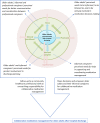Collaborative medication management for older adults after hospital discharge: a qualitative descriptive study
- PMID: 36280875
- PMCID: PMC9590396
- DOI: 10.1186/s12912-022-01061-3
Collaborative medication management for older adults after hospital discharge: a qualitative descriptive study
Abstract
Background: Safe medication management for older adults after hospital discharge requires a well-coordinated, interprofessional, patient-centered approach. This study aimed to describe the perceived needs for collaborative medication management for older adults taking several different medications at home after hospital discharge.
Methods: A qualitative descriptive study was conducted using semi-structured interviews with older adults (n = 28), informal (n = 17), and professional caregivers (n = 13).
Results: Findings revealed four main needs: older adults and informal caregivers' perceived needs for greater involvement in discharge planning; older adults' perceived needs to be informed, listened to, and to be actively involved in decision-making; informal caregivers' perceived needs for help in supporting and coordinating medication management; and older adults' and informal and professional caregivers' perceived needs for better communication and coordination between professional caregivers.
Conclusion: This study revealed two underutilized pathways towards improving collaborative medication management: medication follow-up involving a community healthcare professional taking an overarching responsibility and empowering older adults and their informal caregivers in medication management after hospital discharge.
Keywords: Collaborative medication management; Discharge planning; Home-dwelling; Informal caregivers; Older adults; Polypharmacy; Qualitative descriptive research; Switzerland.
© 2022. The Author(s).
Conflict of interest statement
The authors declared no potential conflicts of interest with respect to the research, authorship, and publication of this article.
Figures
Comment in
-
Involving community healthcare professionals and empowering older adults and their informal carers may improve medication management following hospital discharge.Evid Based Nurs. 2023 Jul;26(3):113. doi: 10.1136/ebnurs-2022-103664. Epub 2023 Feb 6. Evid Based Nurs. 2023. PMID: 36746620 No abstract available.
Similar articles
-
Development of a patient-centred medication management model for polymedicated home-dwelling older adults after hospital discharge: results of a mixed methods study.BMJ Open. 2023 Sep 20;13(9):e072738. doi: 10.1136/bmjopen-2023-072738. BMJ Open. 2023. PMID: 37730411 Free PMC article.
-
Safe Medication Management for Polymedicated Home-Dwelling Older Adults after Hospital Discharge: A Qualitative Study of Older Adults, Informal Caregivers and Healthcare Professionals' Perspectives.Nurs Rep. 2022 May 31;12(2):403-423. doi: 10.3390/nursrep12020039. Nurs Rep. 2022. PMID: 35736616 Free PMC article.
-
Beliefs about Polypharmacy among Home-Dwelling Older Adults Living with Multiple Chronic Conditions, Informal Caregivers and Healthcare Professionals: A Qualitative Study.Healthcare (Basel). 2021 Sep 13;9(9):1204. doi: 10.3390/healthcare9091204. Healthcare (Basel). 2021. PMID: 34574978 Free PMC article.
-
Managing medications: the role of informal caregivers of older adults and people living with dementia. A review of the literature.J Clin Nurs. 2014 Dec;23(23-24):3296-308. doi: 10.1111/jocn.12519. Epub 2013 Dec 20. J Clin Nurs. 2014. PMID: 24354583 Review.
-
Older persons' experiences of adapting to daily life at home after hospital discharge: a qualitative metasummary.BMC Health Serv Res. 2019 Apr 11;19(1):224. doi: 10.1186/s12913-019-4035-z. BMC Health Serv Res. 2019. PMID: 30975144 Free PMC article.
Cited by
-
Intersecting Paths to Health: A Factor Analysis Approach to Socioeconomic and Environmental Determinants in Indiana.Int J Environ Res Public Health. 2025 Feb 4;22(2):219. doi: 10.3390/ijerph22020219. Int J Environ Res Public Health. 2025. PMID: 40003445 Free PMC article.
-
Communication Processes Related to Decision-Making in Medication Management Between Healthcare Providers, Older People and Their Carers: A Systematic Review.Health Expect. 2025 Apr;28(2):e70252. doi: 10.1111/hex.70252. Health Expect. 2025. PMID: 40254932 Free PMC article.
-
Factors associated with perceived medication safety during transitions of care in patients with cancer: A secondary data analysis of a cross-sectional survey.Eur J Oncol Nurs. 2025 Jun;76:102857. doi: 10.1016/j.ejon.2025.102857. Epub 2025 Mar 4. Eur J Oncol Nurs. 2025. PMID: 40068277
-
Challenges and Strategies in Medication Management for Patients With Multiple Comorbidities.Cureus. 2025 Jun 14;17(6):e85992. doi: 10.7759/cureus.85992. eCollection 2025 Jun. Cureus. 2025. PMID: 40662024 Free PMC article. Review.
-
Development of a patient-centred medication management model for polymedicated home-dwelling older adults after hospital discharge: results of a mixed methods study.BMJ Open. 2023 Sep 20;13(9):e072738. doi: 10.1136/bmjopen-2023-072738. BMJ Open. 2023. PMID: 37730411 Free PMC article.
References
-
- World Health Organization. Medication without harm. Geneva; 2017.
-
- Tariq RA, Vashisht R, Sinha A, Scherbak Y. Medication dispensing errors and prevention. 2018. - PubMed
-
- Monégat M, Sermet C, Perronnin M, Rococo E. Polypharmacy: definitions, measurement and stakes involved. Review of the literature and measurement tests. 2014.
Grants and funding
LinkOut - more resources
Full Text Sources


